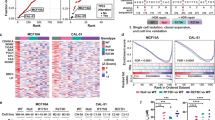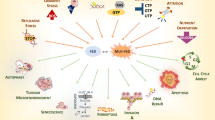Abstract
Human p53, unlike mouse p53, contains a polymorphic site at codon 72 in exon 4 encoding either an arginine amino acid (72R) or a proline residue (72P). The 72R form was shown to induce apoptosis better than the 72P form, partly owing to its ability to efficiently bind to the nuclear-export protein CRM1 and localize to the mitochondria. This polymorphism has also been associated with cancer predisposition and chemo-sensitivity. Further understanding of the in vivo significance of this polymorphism in carcinogenesis requires the generation of mouse models. We have thus evaluated if the polymorphism-specific effects of human p53 are retained in mouse cells. Though being transcriptionally active, both the human polymorphs were found to have lost their ability to differentially suppress growth and bind to CRM1 or MDM2 in mouse cells. Moreover, chimaeric proteins containing mouse exons 2–3 and human exons 4–11 have also lost the polymorphism-specific effects in human cells, suggesting that human exons 2–3 are important in regulating the polymorphism-specific effects. Furthermore, human p53 and the various chimaeric proteins were generally less effective in inhibiting growth of mouse cells compared to mouse p53, suggesting that mouse p53 is more potent than human p53 in suppressing growth, partly due to enhanced binding of MDM2 to human p53. The data together suggest that mouse cells may not provide an appropriate environment for the manifestation of the polymorphism-specific functional differences of human p53, and hence, cautions against the expression of full-length or chimaeric p53 proteins in mice to study the effects of the polymorphism.
This is a preview of subscription content, access via your institution
Access options
Subscribe to this journal
Receive 50 print issues and online access
$259.00 per year
only $5.18 per issue
Buy this article
- Purchase on Springer Link
- Instant access to full article PDF
Prices may be subject to local taxes which are calculated during checkout




Similar content being viewed by others
References
Baptiste N, Friedlander P, Chen X, Prives C . (2002). The proline-rich domain of p53 is required for cooperation with anti-neoplastic agents to promote apoptosis of tumor cells. Oncogene 21: 9–21.
Beckman G, Birgander R, Sjalander A, Saha N, Holmberg PA, Kivela A et al. (1994). Is p53 polymorphism maintained by natural selection? Hum Hered 44: 266–270.
Bergamaschi D, Gasco M, Hiller L, Sullivan A, Syed N, Trigiante G et al. (2003). p53 polymorphism influences response in cancer chemotherapy via modulation of p73-dependent apoptosis. Cancer Cell 3: 387–402.
Buchman VL, Chumakov NN, Ninkina NN, Samarina OP, Georgiev GP . (1988). A variation in the structure of the protein-coding region of the human p53 gene. Gene 70: 245–252.
Chen W, Huang S, Cooper NR . (1998). Levels of p53 in Epstein–Barr virus-infected cells determine cell fate: apoptosis, cell cycle arrest at the G1/S boundary without apoptosis, cell cycle arrest at the G2/M boundary without apoptosis, or unrestricted proliferation. Virology 25: 217–226.
Chen X, Ko LJ, Jayaraman L, Prives C . (1996). p53 levels, functional domains, and DNA damage determine the extent of the apoptotic response of tumor cells. Genes Dev 10: 2438–2451.
Di Como CJ, Gaiddon C, Prives C . (1999). p73 function is inhibited by tumor-derived p53 mutants in mammalian cells. Mol Cell Biol 19: 1438–1449.
Dudgeon C, Kek C, Demidov ON, Saito S, Fernandes K, Diot A et al. (2006). Tumor susceptibility and apoptosis defect in a mouse strain expressing a human p53 transgene. Cancer Res 66: 2928–2936.
Dumont P, Leu JI, Della Pietra III AC, George DL, Murphy M . (2003). The codon 72 polymorphic variants of p53 have markedly different apoptotic potential. Nat Genet 33: 357–365.
Erster S, Moll UM . (2005). Stress-induced p53 runs a transcription-independent death program. Biochem Biophys Res Commun 331: 843–850.
Harris N, Brill E, Shohat O, Prokocimer M, Wolf D, Arai N et al. (1986). Molecular basis for heterogeneity of the human p53 protein. Mol Cell Biol 6: 4650–4656.
Harvey M, Sands AT, Weiss RS, Hegi ME, Wiseman RW, Pantazis P et al. (1993). In vitro growth characteristics of embryo fibroblasts isolated from p53-deficient mice. Oncogene 8: 2457–2467.
Haupt Y, Barak Y, Oren M . (1996). Cell type-specific inhibition of p53-mediated apoptosis by mdm2. EMBO J 15: 1596–1606.
Haupt Y, Rowan S, Shaulian E, Vousden KH, Oren M . (1995). Induction of apoptosis in HeLa cells by trans-activation-deficient p53. Genes Dev 9: 2170–2183.
Jardine LJ, Milne DM, Dumaz N, Meek DW . (1999). Phosphorylation of murine p53, but not human p53, by MAP kinase in vitro and in cultured cells highlights species-dependent variation in post-translation modification. Oncogene 18: 7602–7607.
Jaworski M, Hailfinger S, Buchmann A, Hergenhahn M, Hollstein M, Ittrich C et al. (2005). Human p53 knock-in (hupki) mice do not differ in liver tumor response from their counterparts with murine p53. Carcinogenesis 26: 1829–1834.
Lee MK, Hande MP, Sabapathy K . (2005). Ectopic mTERT expression in mouse embryonic stem cells does not affect differentiation but confers resistance to differentiation- and stress-induced p53-dependent apoptosis. J Cell Sci 118: 819–829.
Luo JL, Yang Q, Tong WM, Hergenhahn M, Wang ZQ, Hollstein M . (2001). Knock-in mice with a chimeric human/murine p53 gene develop normally and show wild-type p53 responses to DNA damaging agents: a new biomedical research tool. Oncogene 20: 320–328.
Marin MC, Jost CA, Brooks LA, Irwin MS, O'Nions J, Tidy JA et al. (2000). A common polymorphism acts as an intragenic modifier of mutant p53 behaviour. Nat Genet 25: 47–54.
Matlashewski GJ, Tuck S, Pim D, Lamb P, Schneider J, Crawford LV . (1987). Primary structure polymorphism at amino acid residue 72 of human p53. Mol Cell Biol 7: 961–963.
Mendrysa SM, McElwee MK, Michalowski J, O'Leary KA, Young KM, Perry ME . (2003). mdm2 Is critical for inhibition of p53 during lymphopoiesis and the response to ionizing irradiation. Mol Cell Biol 23: 462–472.
Mendrysa SM, O'Leary KA, McElwee MK, Michalowski J, Eisenman RN, Powell DA et al. (2006). Tumor suppression and normal aging in mice with constitutively high p53 activity. Genes Dev 20: 16–21.
Papadakis EN, Dokianakis DN, Spandidos DA . (2000). p53 codon 72 polymorphism as a risk factor in the development of breast cancer. Mol Cell Biol Res Commun 3: 389–392.
Pim D, Banks L . (2004). p53 polymorphic variants at codon 72 exert different effects on cell cycle progression. Int J Cancer 108: 196–199.
Rowan S, Ludwig RL, Haupt Y, Bates S, Lu X, Oren M et al. (1996). Specific loss of apoptotic but not cell-cycle arrest function in a human tumor derived p53 mutant. EMBO J 15: 827–838.
Sabapathy K, Klemm M, Jaenisch R, Wagner EF . (1997). Regulation of ES cell differentiation by functional and conformational modulation of p53. EMBO J 16: 6217–6229.
Sakamuro D, Sabbatini P, White E, Prendergast GC . (1997). The polyproline region of p53 is required to activate apoptosis but not growth arrest. Oncogene 15: 887–898.
Schuler M, Green DR . (2005). Transcription, apoptosis and p53: catch-22. Trends Genet 21: 182–187.
Siddique MM, Balram C, Fiszer-Maliszewska L, Aggarwal A, Tan A, Tan P et al. (2005). Evidence for selective expression of the p53 codon 72 polymorphs: implications in cancer development. Cancer Epidemiol Biomarkers Prev 14: 2245–2252.
Siddique MM, Sabapathy K . (2006). Trp53-dependent DNA-repair is affected by the codon 72 polymorphism. Oncogene 25: 3489–3500.
Själander A, Birgander R, Hallmans G, Cajander S, Lenner P, Athlin L et al. (1996). p53 polymorphisms and haplotypes in breast cancer. Carcinogenesis (London) 17: 1313–1316.
Storey A, Thomas M, Kalita A, Harwood C, Gardiol D, Mantovani F et al. (1998). Role of a p53 polymorphism in the development of human papillomavirus-associated cancer. Nature 393: 229–234.
Strano S, Munarriz E, Rossi M, Cristofanelli B, Shaul Y, Castagnoli L et al. (2000). Physical and functional interaction between p53 mutants and different isoforms of p73. J Biol Chem 275: 29503–29512.
Sullivan A, Syed N, Gasco M, Bergamaschi D, Trigiante G, Attard M et al. (2004). Polymorphism in wild-type p53 modulates response to chemotherapy in vitro and in vivo. Oncogene 23: 3328–3337.
Thomas M, Kalita A, Labrecque S, Pim D, Banks L, Matlashewski G . (1999). Two polymorphic variants of wild-type p53 differ biochemically and biologically. Mol Cell Biol 19: 1092–1100.
Toh WH, Kyo S, Sabapathy K . (2005). Relief of p53-mediated telomerase suppression by p73. J Biol Chem 280: 17329–17338.
Tong WM, Lee MK, Galendo G, Wang ZQ, Sabapathy K . (2006). Aflatoxin-B exposure does not lead to p53 mutations but results in enhanced liver cancer of Hupki (human p53 knock-in) mice. Int J Cancer 119: 745–749.
Venkatachalam S, Tyner SD, Pickering CR, Boley S, Recio L, French JE et al. (2001). Is p53 haploinsufficient for tumor suppression? Implications for the p53+/− mouse model in carcinogenicity testing. Toxicol Pathol 29: 147–154.
Vikhanskaya F, Siddique MM, Kei Lee M, Broggini M, Sabapathy K . (2005). Evaluation of the combined effect of p53 codon 72 polymorphism and hotspot mutations in response to anticancer drugs. Clin Cancer Res 11: 4348–4356.
Vogelstein B, Lane D, Levine AJ . (2000). Surfing the p53 network. Nature 408: 307–310.
Vousden KH, Lu X . (2002). Live or let die: the cell's response to p53. Nat Rev Cancer 2: 594–604.
Walker KK, Levine AJ . (1996). Identification of a novel p53 functional domain that is necessary for efficient growth suppression. Proc Natl Acad Sci USA 93: 15335–15340.
Weston A, Godbold JH . (1997). Polymorphisms of H-ras-1 and p53 in breast cancer and lung cancer: a meta-analysis. Environ Health Perspect 105: 919–926.
Yu J, Zhang L . (2005). The transcriptional targets of p53 in apoptosis control. Biochem Biophys Res Commun 331: 851–858.
Acknowledgements
We thank Dr Kenneth Lee for critical reading of the paper and the National Medical Research Council, Singapore, for their generous funding and support to KS.
Author information
Authors and Affiliations
Corresponding author
Rights and permissions
About this article
Cite this article
Phang, B., Sabapathy, K. The codon 72 polymorphism-specific effects of human p53 are absent in mouse cells: implications on generation of mouse models. Oncogene 26, 2964–2974 (2007). https://doi.org/10.1038/sj.onc.1210112
Received:
Revised:
Accepted:
Published:
Issue Date:
DOI: https://doi.org/10.1038/sj.onc.1210112
Keywords
This article is cited by
-
Serine 312 phosphorylation is dispensable for wild-type p53 functions in vivo
Cell Death & Differentiation (2011)
-
The proline-rich domain in p63 is necessary for the transcriptional and apoptosis-inducing activities of TAp63
Oncogene (2008)



